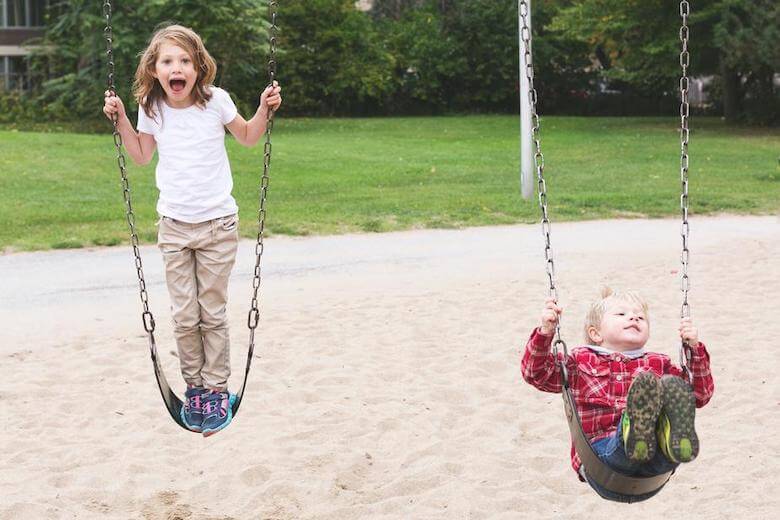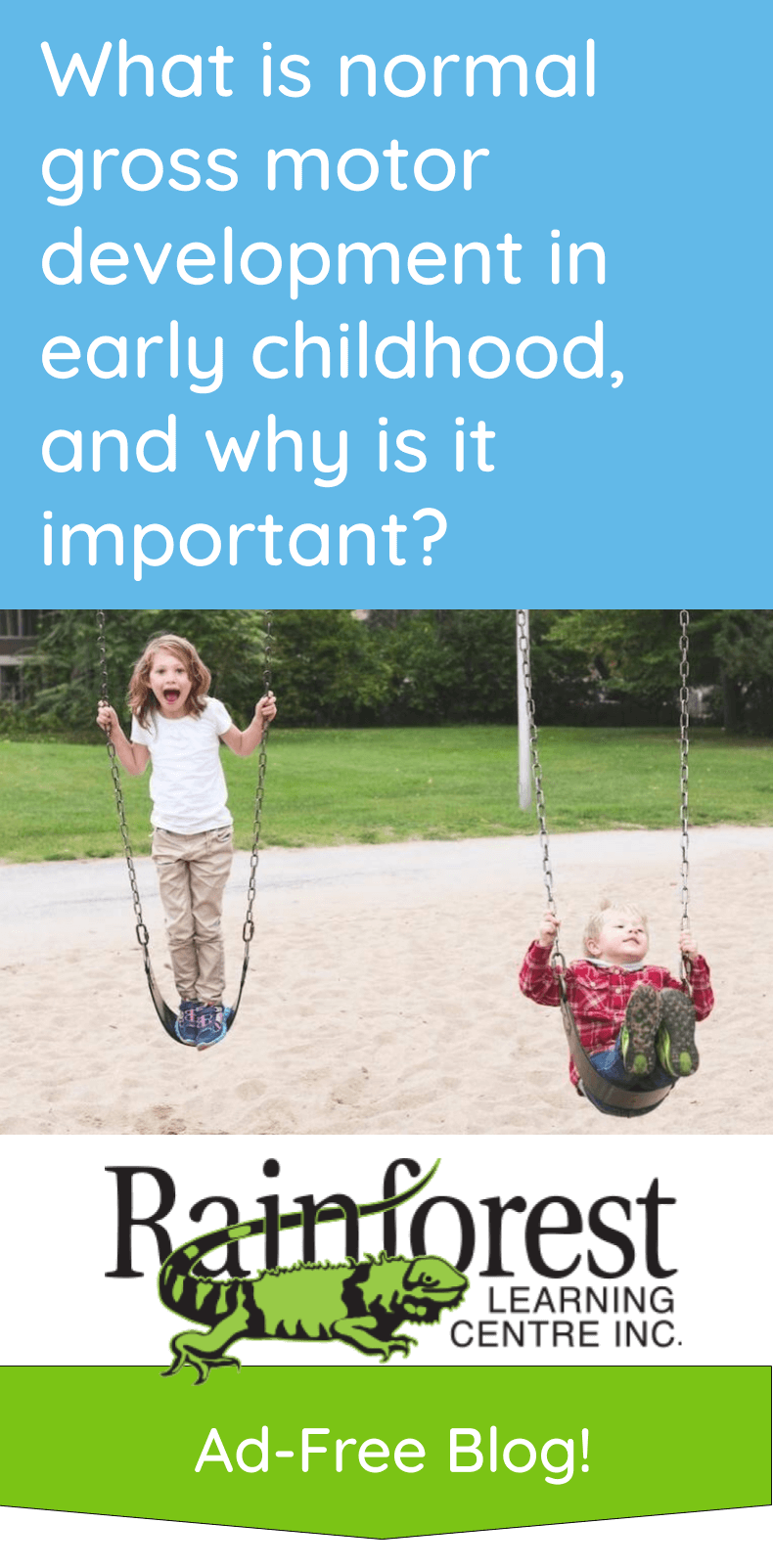
Children develop in various ways as they grow. Earlier, we wrote about cognitive development, and its milestones. However, brain function is also related to physical function. The physical functioning of a child can be indicative, in some cases, of how well they are developing cognitively. The normal, physical skills obtained by a child as they grow are, collectively, called motor development. Motor development comes in two categories: fine motor skills and gross motor skills. Fine motor skills are the tasks we do with ‘small’ muscles, like our fingers (buttoning a shirt, for example). Gross motor skills are the things we do with ‘large’ muscles, like walking and jumping.
So, what is considered appropriate, normal, gross motor development in early childhood? Why is it important? We’ll answer those questions below!
What gross motor skills should a child have by preschool age?
Gross motor skills in early childhood come in at least three sub-categories, according to this blogger. They are:
- Locomotor – this is moving around from one spot to another.
- Non-locomotor skills – this is moving body parts around, while standing in one spot.
- Manipulative skills – this is moving objects and things with the body.
By the ages of around 4 – 5, a typical preschooler should be able to:
- Jump and skip using one or both feet, including by balancing on ‘bouncy’ surface, like a bed, couch or trampoline
- Walk, skip or jump sideways, forwards and backwards
- Climb typical playground equipment (not necessarily with ladders)
- Do a summersault
- Stand on one foot for at least a few seconds, and maintain balance
- Kick, throw, catch and dribble or bounce a ball
- Use a swing and go down a slide
- Hang from monkey bars
- Walk up and down stairs (holding a rail is ok)
- Use a tricycle or glider bike
At age 6 or so, they should also be able to walk on a balance beam, and ride a bike. They start to develop more and more skills based on the above foundations, such as jumping rope. And, they’ll start to enjoy more organized, or purposeful sports like soccer, dance or karate.
Why are gross motor skill milestones important in children?
Gross motor skills are a natural part of normal development. They are not a ‘nice thing to have.’ They indicate how well, overall, a human is growing – even cognitively. For example, it’s normal for a baby to gain strength in the legs and abdomen to be able to lift themselves up and begin to crawl. That may start with wriggling around on the floor, and it usually ends with the ability to stand up and walk. It would be alarming if a baby turned into a preschooler, and still could not do this. There could be a health problem that needs attention, in a case like this.
However, in preschool age, there are also some things that a child should be able to do. Whether they can accomplish certain milestones by a certain age may have to do with multiple factors. It could be a matter of confidence, or lack of practice, rather than a serious health issue (especially if no known disorders are present).
We should mention that the timing of physical development with gross motor skills can be fluid. It’s fine if your child is afraid of climbing at age 3 or 4, or doesn’t want to ride a horse yet. They could be an overly cautious kid. Being afraid of heights and horses, and not being able to climb or hang on at all, are two different things.
While not all of us will have excelling athletic skills etched in our DNA, we should all know how to act and move independently. We should be able to survive, too, quite frankly, with these gross motor skills. For example, we should have a sense of balance, and be able to keep that balance. Children in early childhood should learn how to stand on one foot, or ride a bike, and not fall over. They also should be able to push and pull, or have complete control over how they twist and turn and kick. They should have appropriate reaction times to protect themselves. They should be aware of what their body can and cannot do. This is part of being human.
While no child should be rushed beyond their capacity, learning these skills on time is important. So, a little encouragement and practice is key, if a kid is falling behind with gross motor development in early childhood.
And of course, motor movement is what contributes to a healthy lifestyle, and a strong body (i.e. it’s needed for exercise!). That’s important too! It leads to self confidence when interacting in social situations, and a host of other things.
How can I help my child develop strong gross motor skills?
As caregivers, we can encourage gross motor development, by giving children lots of opportunity for play. Thankfully, children love to play! It’s part of their normal development and inclination to do so.
Outdoor play is especially important for children. Being outside has many benefits apart from encouraging gross motor skills. Children learn about nature and develop sensory abilities, too. Playgrounds are often designed to allow children to learn to balance and climb things, and to use their muscle strength. Running in itself (such as on a grassy field) can give children exercise, and a way to burn off energy.
And, indoors or outdoors, there are special, ‘fun’ activities kids can participate in to develop their physical skills and body movements. Here are some ideas:
- Pretend to move around like different animals. Here is a great list of ideas.
- Lead children in a game of ‘Simon Says,’ to help them pay attention to specific movements.
- Audibly explain the steps to a movement or action. For example, “one step first, then the next, then hop over here.”
- Get them to do exercises that force the strengthening of muscles, such as swimming, or even kids’ yoga.
And so on.
Also, while we won’t encourage dangerous activities for young kids, we will say that you shouldn’t discourage the normal inclinations children will have to want to climb and develop these skills. If you’re worried your child might fall, don’t try stop them. Just help them get better at it!
Normal gross motor development in early childhood should be tracked and noticed
Finally, if you feel something is wrong, and your child is not developing their core gross motor skills sufficiently enough, be sure to see a doctor. Even if things were progressing fine until a certain age, it’s important to keep a family doctor informed on what you see in the everyday life of your child.
See related posts on our blog:
- How to teach playground safety at daycare
- Does your child need an occupational therapist? Here is what to know
- What are normal fine motor skills to have in the early childhood years, and why are they important?
- What is cognitive development in early childhood?
- Why sensory development skills are important at daycare
- Does my child have a sensory processing disorder or are they just hypersensitive?
- How to recognize early vision problems in toddlers and preschoolers
